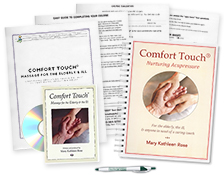 Want to earn continuing education credit for this article? Learn more.
Want to earn continuing education credit for this article? Learn more.
Last Updated: March 2018
Most common in the elderly and marked by a progressive decline of brain function, dementia is the impairment of reasoning, memory and other cognitive abilities. This decline eventually impacts daily activities, limiting everything from driving to bathing to feeding. About 4 to 5 million people in the United States have some degree of dementia, and that number is estimated to increase over the next few decades as the population ages. The most well known form of dementia is Alzheimer’s disease. While there is no cure for dementia or Alzheimer’s disease, evidence suggests that alternative therapies can improve their symptoms and greatly benefit a person’s quality of life.
Dementia Symptoms
The most common characteristics of dementia are:
- Memory loss
- Impaired concentration and comprehension
- Depression
- Hallucinations, delusions, psychosis
- Aggression, agitation, anxiety, restlessness
- Accusatory behaviors
- Withdrawal, disinterest, hostility, loss of inhibitions
- Insomnia or disturbances in sleep patterns
The Power of Touch
As somatic healthcare practitioners, we have the opportunity to make contact with a person struggling with dementia unlike any other caregiver through our attention, communication and fostering a sense of overall well-being.
Attention – Between the decline of performing everyday activities and maintaining interpersonal relationships, the ramifications of deteriorating brain function are very frightening. A caring individual capable of focusing their non-judgmental attention on a person with dementia eases the fear of losing touch with society. This attention may be the only source of social interaction this person has.
Communication – The anxiety and frustration typical of dementia is amplified by the person’s inability to verbally communicate. Bodywork’s utilization of healing touch serves as a form of nonverbal communication capable of bridging the isolation typically experienced with a loss of cognitive abilities.
Well-being – Although each individual will have slightly varying symptoms, lacking a sense of well-being is universal in people with dementia. Some of the proven physical benefits of massage that contribute to a sense of well-being include:
- Stress reduction
- Deepened relaxation and breathing
- Lowering of blood pressure
- Circulation stimulation
- Pain relief
- Aiding in restful sleep
- Endorphin release
- Fear and anxiety reduction
Research
There is some compelling evidence demonstrating bodywork’s benefit for people with dementia:
- As published in the Cochrane Library in October 2006, Danish researchers confirm that massage may offer a drug-free way to treat agitation and depression among dementia patients. In two of the studies reviewed, hand massage and gentle touching during conversation helped ease agitation and restore appetite in dementia patients over short periods of time.
- According to a 2002 study conducted at Newcastle General Hospital’s Wolfson Research Centre, lotion containing essential oil of Melissa reduced agitation and increased constructive activity in people with severe dementia.
- In 1999, researchers at the University of Texas found that the more physical aspects of dementia-related agitation such as pacing, wandering, and resisting significantly decreased after participants received slow-stroke massage.
- In a one-year demonstration project at Schervier Nursing Care Center in Riverdale, New York, the facility offered a Tender Touch massage to residents. The findings indicated that massage therapy helped eliminate anxiety in residents with dementia.
Specific Concerns
When performing bodywork to reduce symptoms of dementia, therapists will likely be working with the elderly. The three special areas of concern specific to this age group that must be acknowledged by the therapist are modesty, health issues and medications affecting massage.
Modesty – Due to the cultural beliefs held by older generations, it is important for massage therapists to be sensitive to modesty issues. For example, a client may consider undressing for a massage to be immodest. If asked to disrobe without respectfully addressing their privacy, a recipient may experience the session to be uncomfortable and stressful. Giving plenty of time and privacy considerations will contribute to building a trusting therapeutic relationship.
Health Issues – When working with this population, it is important to be educated and sensitive to a wide variety of health conditions. Awareness of a client’s health issues is necessary prior to giving a massage so the technique can be customized to best fit the client’s needs. Special attention should be paid to issues related to blood clotting, vein inflammation, deep vein thrombosis, severe swelling, skin lesions, hematomas and abdominal aneurysm, all of which have various degrees of contraindication or precaution with regard to massage therapy.
Medications – Therapists must know how to assess the medications taken by clients to determine any potential contraindications. Familiarity with the medications typically prescribed to a person with dementia, and how those drugs impact massage will assist the therapist in choosing the most appropriate strokes to administer a safe and supportive treatment.
Working with people suffering with dementia is an extremely rewarding niche. Due to their loss of cognitive ability, those with dementia are often segregated from the rest of society. In addition to providing a safe and caring method to reduce dementia’s symptoms, bodyworkers have the unique opportunity to be the only person capable of communicating with their client. When properly educated and prepared, bodyworkers have the power to convey compassion to a person with dementia through the power of touch.
Earn continuing education credit for this article contained in our Nervous System Disorders series.ph














